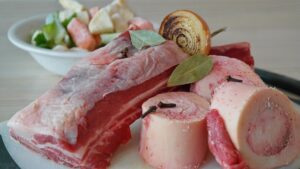15 High-Protein Foods to Add to Your Meals, According to Nutritionists.Protein is a vital macronutrient that supports numerous bodily functions, including muscle repair, enzyme production, hormone synthesis, and immune system maintenance. Incorporating high-protein foods into your diet can enhance muscle growth, support weight management, and promote overall health. Here are 15 high-protein foods recommended by nutritionists, along with detailed explanations of their benefits and tips on how to incorporate them into your meals.
1. Eggs
Nutritional Profile:
- Protein: 6 grams per large egg
- Rich in vitamins A, D, E, and B12
- Contains choline, essential for brain health
Benefits:
Eggs are a complete protein source, providing all nine essential amino acids. They are versatile and easy to cook, making them a staple in many diets. The high choline content in eggs supports brain health and cognitive function.
Incorporation Tips:
- Breakfast: Scramble or fry eggs, make omelets with vegetables, or boil them.
- Lunch/Dinner: Add boiled eggs to salads or make egg-based dishes like quiches.
- Snacks: Hard-boiled eggs are convenient and portable.
2. Greek Yogurt
Nutritional Profile:
- Protein: 10 grams per 100 grams
- High in probiotics
- Contains calcium and vitamin B12
Benefits:
Greek yogurt has almost double the protein content of regular yogurt and is rich in probiotics that support gut health. Its thick texture makes it a satisfying snack or meal addition.
Incorporation Tips:
- Breakfast: Mix with fruits, nuts, and seeds.
- Smoothies: Blend with fruits and protein powder for a nutrient-packed smoothie.
- Savory Dishes: Use as a base for creamy sauces or dressings.
3. Chicken Breast
Nutritional Profile:
- Protein: 31 grams per 100 grams
- Low in fat, especially when skinless
- Rich in niacin and vitamin B6
Benefits:
Chicken breast is a lean source of high-quality protein, making it ideal for muscle repair and growth. It is also versatile and can be prepared in various ways to suit different tastes.
Incorporation Tips:
- Grilling: Grill with herbs and spices for a healthy meal.
- Stir-frying: Combine with vegetables for a quick and nutritious dish.
- Salads: Add shredded chicken to salads for extra protein.
4. Salmon
Nutritional Profile:
- Protein: 20 grams per 100 grams
- High in omega-3 fatty acids
- Contains vitamins D and B12
Benefits:
Salmon is not only a great source of protein but also rich in heart-healthy omega-3 fatty acids, which reduce inflammation and support cardiovascular health. It also provides essential vitamins and minerals.
Incorporation Tips:
- Baking: Bake with lemon and herbs.
- Grilling: Grill with a marinade of your choice.
- Salads: Use smoked salmon in salads or on whole-grain toast.

5. Quinoa
Nutritional Profile:
- Protein: 8 grams per cup cooked
- Contains all nine essential amino acids
- High in fiber and magnesium
Benefits:
Quinoa is a complete protein source, making it an excellent choice for vegetarians and vegans. It is also gluten-free and high in fiber, promoting digestive health.
Incorporation Tips:
- Side Dish: Serve as a side with vegetables and lean proteins.
- Salads: Add to salads for extra protein and texture.
- Breakfast: Make a quinoa porridge with fruits and nuts.
6. Lentils
Nutritional Profile:
- Protein: 9 grams per 100 grams cooked
- High in fiber and iron
- Rich in folate and magnesium
Benefits:
Lentils are a plant-based protein powerhouse, rich in fiber, which helps maintain healthy digestion and iron, supporting oxygen transport in the body. They are also versatile and inexpensive.
Incorporation Tips:
- Soups: Add to soups and stews for a protein boost.
- Salads: Mix with vegetables and a light dressing.
- Main Dishes: Make lentil-based curries or burgers.
7. Cottage Cheese
Nutritional Profile:
- Protein: 11 grams per 100 grams
- High in calcium
- Contains probiotics
Benefits:
Cottage cheese is rich in casein protein, which digests slowly and provides a sustained release of amino acids, making it ideal for muscle maintenance and repair. It is also a good source of calcium.
Incorporation Tips:
- Snacks: Pair with fruits or vegetables.
- Breakfast: Mix with berries and a drizzle of honey.
- Savory Dishes: Use as a base for dips or mix into pasta dishes.
8. Turkey
Nutritional Profile:
- Protein: 29 grams per 100 grams (cooked, skinless breast)
- Low in fat
- Rich in selenium and tryptophan
Benefits:
Turkey is a lean meat with high protein content, supporting muscle growth and repair. It is also a good source of selenium, which plays a role in thyroid hormone metabolism and antioxidant defense.
Incorporation Tips:
- Roasting: Roast with herbs and spices.
- Ground Turkey: Use in place of ground beef for a leaner option.
- Sandwiches: Add sliced turkey breast to sandwiches and wraps.
9. Almonds
Nutritional Profile:
- Protein: 6 grams per 28 grams (about 23 almonds)
- High in healthy fats and vitamin E
- Contains magnesium and fiber
Benefits:
Almonds are a convenient snack that provides a good amount of protein along with healthy fats, fiber, and vitamin E. They support heart health and can help regulate blood sugar levels.
Incorporation Tips:
- Snacks: Eat raw or roasted as a snack.
- Salads: Add to salads for extra crunch.
- Breakfast: Mix into yogurt or oatmeal.
10. Edamame
Nutritional Profile:
- Protein: 11 grams per 100 grams
- Rich in fiber and antioxidants
- Contains folate and vitamin K
Benefits:
Edamame, young soybeans, are a great plant-based protein source with high fiber content, supporting digestive health. They also provide antioxidants that help fight inflammation.
Incorporation Tips:
- Snacks: Enjoy steamed with a sprinkle of sea salt.
- Salads: Add to salads for extra protein.
- Stir-fries: Incorporate into vegetable stir-fries.
11. Tuna
Nutritional Profile:
- Protein: 25 grams per 100 grams
- High in omega-3 fatty acids
- Contains vitamin D and selenium
Benefits:
Tuna is a lean protein source that is rich in omega-3 fatty acids, promoting heart health. It is also a good source of vitamin D, supporting bone health and immune function.
Incorporation Tips:
- Sandwiches: Make tuna salad sandwiches with whole-grain bread.
- Salads: Add to green salads or pasta salads.
- Main Dishes: Use in casseroles or bake with vegetables.
12. Chickpeas
Nutritional Profile:
- Protein: 8 grams per 100 grams (cooked)
- High in fiber and iron
- Rich in folate and magnesium
Benefits:
Chickpeas, or garbanzo beans, are a versatile and nutrient-dense legume that provides ample protein and fiber, supporting digestive health and satiety. They also contain iron and folate, important for blood health.
Incorporation Tips:
- Salads: Add to salads for extra protein and texture.
- Snacks: Roast with spices for a crunchy snack.
- Main Dishes: Make hummus or add to stews and curries.
13. Beef
Nutritional Profile:
- Protein: 26 grams per 100 grams (lean cuts)
- Rich in iron and zinc
- Contains vitamin B12 and creatine
Benefits:
Beef is a complete protein source that provides essential nutrients like iron and zinc, supporting immune function and oxygen transport. It is also high in vitamin B12, which is important for nerve function and red blood cell formation.
Incorporation Tips:
- Grilling: Grill lean cuts with herbs and spices.
- Stir-fries: Use in vegetable stir-fries.
- Main Dishes: Make beef stews or use ground beef in chili.
14. Pumpkin Seeds
Nutritional Profile:
- Protein: 7 grams per 28 grams (1 ounce)
- High in magnesium and zinc
- Contains antioxidants
Benefits:
Pumpkin seeds are a nutritious snack that provides a good amount of protein along with magnesium and zinc, supporting muscle function and immune health. They are also rich in antioxidants.
Incorporation Tips:
- Snacks: Eat raw or roasted as a snack.
- Salads: Sprinkle on salads for extra crunch.
- Breakfast: Add to yogurt or oatmeal.
15. Tofu
Nutritional Profile:
- Protein: 8 grams per 100 grams
- Contains all nine essential amino acids
- Rich in iron and calcium
Benefits:
Tofu is a versatile plant-based protein source made from soybeans. It provides all essential amino acids, making it a complete protein. It is also high in iron and calcium, supporting bone health and oxygen transport.
Incorporation Tips:
- Stir-fries: Use in vegetable stir-fries.
- Salads: Add to salads for extra protein.
- Main Dishes: Grill or bake with your favorite seasonings.
Conclusion
Incorporating high-protein foods into your diet can have numerous health benefits, from supporting muscle growth and repair to enhancing satiety and aiding weight management. By including a variety of protein sources, you can ensure you get all essential amino acids and other important nutrients necessary for optimal health. Whether you prefer animal-based or plant-based proteins, there are plenty of delicious and nutritious options to choose from. Here’s a quick reference for incorporating these 15 high-protein foods into your meals:
- Eggs: Versatile for breakfast, lunch, and snacks.
- Greek Yogurt: Perfect for breakfast, smoothies, and savory dishes.
- Chicken Breast: Ideal for grilling, stir-frying, and salads.
- Salmon: Great for baking, grilling, and salads.
- Quinoa: Useful as a side dish, in salads, and for breakfast.
- Lentils: Excellent in soups, salads, and main dishes.
- Cottage Cheese: Suitable for snacks, breakfast, and savory dishes.
- Turkey: Versatile for roasting, ground dishes, and sandwiches.
- Almonds: Convenient for snacks, salads, and breakfast.
- Edamame: Perfect for snacks, salads, and stir-fries.
- Tuna: Ideal for sandwiches, salads, and main dishes.
- Chickpeas: Great for salads, snacks, and main dishes.
- Beef: Versatile for grilling, stir-fries, and main dishes.
- Pumpkin Seeds: Perfect for snacks, salads, and breakfast.
- Tofu: Suitable for stir-fries, salads, and main dishes.
By including these high-protein foods in your diet, you can enjoy a range of delicious meals while meeting your protein needs and supporting overall health and well-being


1 comment
Thank you for some other fantastic article. The place else may just anybody get that type of info in such an ideal approach of writing? I have a presentation subsequent week, and I’m at the look for such information.